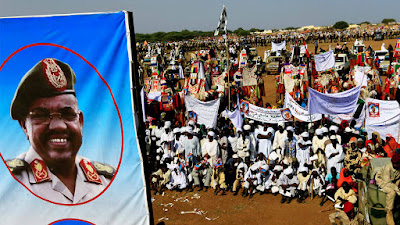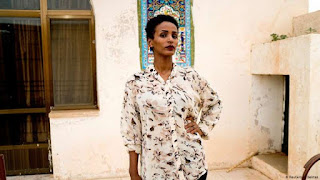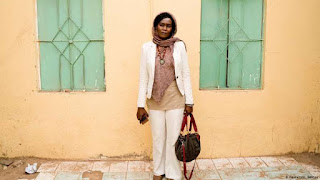Note from Sudan Watch Editor: Copied here below is an astonishing article. Since 2004 I have lost count of the number of times that the US promised to remove Sudan from the state sponsors of terror list and lift sanctions in exchange for action that included behaviour.
The more intelligence that the US wanted to squeeze from Sudan in pursuit of Al Qaeda, Bin Laden et al, the more it dangled a carrot. The US never followed through. Who can blame Sudan for feeling stung.
Also, the article explains how the US was behind splitting Sudan apart. It makes me feel sick to read what went on behind the scenes while millions of Sudanese were terrorised, displaced, maimed, starved, killed.
Hat tip to Justin Lynch for such candid reporting. Note the date of report. Yellow highlighting is mine.
Article from The Daily Beast
Dated 09 January 2019 4:50AM ET
Why is Sudan’s Genocidal Regime a CIA Favorite?
Mohamed Nureldin Abdallah/Reuters
One of the most respected American diplomats to work in Africa, Princeton Lyman, was set to meet in September 2012 with members of a Sudanese plot to overthrow President Omar al-Bashir, who is accused of genocide in Darfur.
For hours Lyman waited in an opulent hotel overlooking the Nile River in Cairo for Salah Gosh, Sudan’s former director of national security and at one time a CIA collaborator, who was a participant in the plan.
As the State Department’s special envoy for Sudan and South Sudan, Lyman had tentatively exchanged messages with the plot’s members for months. Lyman described the group to me as military men who felt “they had been professionally betrayed” by Bashir’s leadership. The Sudanese men reached out to Lyman in early 2012 as discontent was growing inside the military. Accused of genocide, funding terrorism, and waging war against South Sudan, Khartoum was seen as a problem-child of a global order. No longer, said the army officials, who wanted to see if the Americans would recognize a military takeover in Sudan, even though under U.S. law such recognition was illegal.
“I was very conscious of the fact that you could not have the United States policy for the overthrow of even an indicted [leader],” Lyman told me. But he believed that the United States should engage with anyone seeking reform in Sudan, especially if the change could come with a minimum of chaos and carnage.
Weeks earlier, Lyman gave a speech including language for the plotters that laid out what a new relationship would look like. It was a diplomatic high-wire act that did not explicitly support the coup, but embraced change if it came.
“The government would show itself to be accountable, committed to democracy, to respect for human rights,” Lyman said Aug. 1, 2012, according to his prepared remarks. “I can imagine a Sudan Armed Forces no longer as one in violation of international norms but one taking its place as a highly regarded professional military.”
Lyman ended with a flourish. “If it comes to pass, the United States will respond.”
As diplomatic signals go, few are more blunt.
Back in Cairo a few weeks later on the September day at the hotel, Lyman waited to meet Gosh. And waited. Lyman told me that Gosh was pulled into the plot at the late stages to give it a political face and he did not hatch the plan himself. But Gosh never appeared for the meeting. Lyman returned home dejected, and did not communicate again with the group.
Bashir uncovered the plot. Gosh was detained. But the American involvement has never been revealed until now.
The United States offered no military, financial or any other form of support to the plan—only a promise that the American government would engage with the new leaders if the plot took place. Yet the fact Lyman met with participants in a plot already set in motion is a sign of the intimate American relationship that exists with top Sudanese military and political figures.
Lyman told The Daily Beast these details days before he passed away in August last year. He shared the story, he said, because he thought it showed the importance of meeting with anyone who pursued reform in Sudan and demonstrated the risks diplomats should take, and do take, in the name of peace. His account was confirmed and expanded on by Colin Thomas-Jensen, Lyman’s special adviser at the time, and others who are familiar with the events.
Today, new protests in Sudan are approaching a new boiling point, and Lyman’s story is history. But it suggests the still very relevant and largely untold story of the relationship between Sudan and the United States—ties largely based on the clout of the powerful intelligence services in both the Trump and Obama administrations.
This article is based in part on interviews and documents from 13 current and former American officials serving in the State Department, Pentagon, CIA, and other areas of the U.S. government.
The CIA declined to comment. The White House referred questions to the State Department. The State Department is under furlough, but in a January 8 joint press release with other countries said that it was “appalled by reports of deaths and serious injury to those exercising their legitimate right to protest,” adding that its future engagement will depend on the government’s “actions and decisions.”
The current mass protests, which began in December, have spread across Sudan and threaten to topple the three-decade rule of Bashir. Demonstrators have adopted the chorus of "the people demand the fall of the regime," a slogan from the 2011 Arab Spring protests. Security forces have killed at least 37 protesters, according to a December 24 release by Amnesty International. Citing the Sudanese interior minister, the Associated Press reported that 816 people have been arrested.
“These protests are as serious as can be,” said Alex De Waal, professor at Tufts University and author of seven books on Sudan. “Any next steps involve one of two things. Either it is for Bashir to step down gracefully and be assured his safety by a regional body, or it would be through a takeover from a coalition of military and army officials.”
Gosh, who is now head of Sudan’s intelligence service, is seen under the circumstances as a potential king-maker. His relationship with the CIA and other intelligence services is well known. He was chauffeured to Washington on a private jet in 2005 to discuss intelligence cooperation and the situation in Darfur which then-Secretary of State Colin Powell had acknowledged as a “genocide“ in September 2004.
Even after some details of the half-baked plot of 2012 were uncovered, Gosh managed to climb back into Bashir’s inner circle in 2018 with support from the United Arab Emirates and Saudi Arabia.
“The extent to which the U.S. is conveying any messages that are shaping thinking in Khartoum is likely entirely dependent on what the CIA is saying to Salah Gosh,” said a former U.S. official familiar with the situation.
Although Sudan has been listed as a state sponsor of terror since 1993 and the U.S. has accused al-Bashir more than once of genocide for his government’s actions in Darfur, cooperation between the two countries has been close on particular issues that Washington sees as a priority, particularly the fight against terrorist jihadis.
After the September 11, 2001, attacks on the U.S., Sudan—which had sheltered Osama bin Laden in the 1990s—cooperated closely in the hunt for al Qaeda operatives. Afraid they might be next on the list of countries targeted as an “axis of evil,” Sudanese forces conducted counter-terrorism missions to stop the flow of militants from West Africa to Iraq, where some tried to join the jihad against U.S. forces on the ground there.
Although his secretary of state had accused Bashir of genocide in Darfur, where his regime which anywhere from 200,000 to 300,000 people, former President George W. Bush was secretly in contact with the Sudanese leader, according to a Bush White House official. That included a phone call in January 2005, when the intelligence community learned that Bashir was wavering over whether he should sign a deal to give South Sudan independence. Bush eventually convinced Bashir to sign the agreement.
The relationship gained an added dimension after the 2011 civil war in Libya created a constellation of militant groups. With its strategic location nestled on the southern border of Libya, Sudan’s counter-terrorism ties with America blossomed. Talks were held repeatedly to reform the political relationship with Sudan.
Although the United States promised to remove Sudan from the state sponsors of terror list and lift sanctions in exchange for actions that included good behavior, the Americans never followed through. The Sudanese felt suckered by the Americans, according to Lyman and current and former U.S. officials involved in the talks.
An inflection point in the American-Sudanese intelligence relationship came in 2015 when Sudan dramatically reduced its counterterrorism collaboration with the Americans.
Then-CIA director John Brennan was one of the biggest advocates for reform of the American-Sudanese relationship. Sudan “cut their C.T. cooperation, and then Brennan calls whoever and says ‘What the fuck, why aren’t these guys cooperating with me?’ I think they have a sense of how to create a little tension inside the U.S. government,” a former Obama administration official said. “There was a scream from across the river [at the CIA]: ‘We need this relationship, isn’t there anything we can do?’”
For the CIA and the Pentagon, clandestine access to Libya and information regarding al-Shabaab leaders who were educated in Khartoum was considered highly valuable.
Under then-National Security Adviser Susan Rice, the White House began a process to restore relations with Sudan. As one of the last acts of the Obama administration in January 2017, the United States began a five-track process to restore relations that depend on humanitarian access, stopping violence and counter-terrorism collaboration.
That process has expanded under the Trump administration, and in late-October the United States entered a second re-engagement with Sudan.
That normalized relations with Sudan is a foreign policy goal with rare bipartisan support of both the Obama and Trump administrations is in no small part due to the former CIA officials serving in both the Obama and Trump White Houses who value the counter-terrorism and intelligence sharing benefits of closer diplomatic engagement, according to current and former officials involved in internal deliberations of both administrations.
State Department officials said that normalized relations with Sudan depend on the fulfillment of conditions laid out in its agreement, which include human rights and humanitarian access.
However, those inside the U.S. government opposed to the plan doubt the Sudanese are offering substantial intelligence cooperation. These American officials argue it sends a bad signal that a genocidal regime can be welcomed back into the international community. And they say normalized relations unfairly reward Khartoum as it still supports some terrorist actors or and continues to wage war against its own people.
A decision to fully restore relations may be on the horizon, nonetheless. The Trump administration agreed with Sudanese officials to end the second phase of the re-engagement plan in August 2019, although that timeline could shift based on Khartoum’s compliance, according to a current official and another former official familiar with the matter.
But Congress, which has the ability to block the action, has not yet been informed of the timeline, according to a Senate aide.
A fully restored relationship with Sudan would be a sign of how influential the CIA has become with the Arab state.
“Contrary to conventional wisdom, having the intelligence community play the preponderant role in shaping and executing policy toward Sudan has actually been the exception rather than the rule in the post-9/11 period, and only became the case in the last two years of the Obama administration and now under President Trump,” said the former American official who discussed the CIA’s potential communications with Gosh.
For the Sudanese government, restored relations would be cause for celebration.
As midterm election results rolled in on the night of Nov. 6, Sudanese foreign minister Dirdeiry Mohamed Ahmed held court in the Fairmont Hotel in the Georgetown District of Washington D.C. He had just met with the State Department to discuss restoring relations. But Dirdeiry, as American officials call him, barely touched the glass of water in front of him as he jabbered at two reporters.
“The United States is definitely a very important state in the world, and we would like to have good relations with it,” Dirdeiry said. “The level of cooperation that Sudan is having with the United States in particular and also there in the region at large in countering terrorism is exemplary.”










